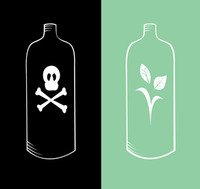
Running an environmentally
conscious home means considering every aspect of your lifestyle. From
energy usage to food waste, there are myriad ways to cut your
family’s energy footprint and soften your impact on the environment,
and today we’re focusing on one often overlooked aspect of the home:
your choice of cleaning products.
Most mainstream cleaning
products are made without much regard for environmental safety.
Bleaches, disinfectants and other potentially harmful products are
among the most commonly used cleaning agents, but are these
industrial chemicals really necessary in the home? And just how
dangerous are they?
Sodium Hypochlorite,
commonly known as household bleach, is a ubiquitous presence in
British homes. A powerful bactericide and stain remover, nobody
doubts the effectiveness of bleach, but what are the consequences of
using it? You may be surprised to hear that, despite its strong odour
and dramatic effect, bleach is not considered an environmental
hazard. This is because bleach is extremely reactive with other
materials, which means that instead of hanging around to cause
damage, Sodium Hypochlorite quickly reacts with other natural chemicals, producing a variety of safe byproducts. Even water
pollution is negligible, since bleach dilutes so easily, it’s soon
absorbed into the water, where it forms natural sodium and chloride
compounds.
So are all household
chemicals as safe as bleach? The short answer is ‘no,’ but the long
answer is more complicated. There are thousands of different cleaning
products in use around the world by billions of people. This results
in millions of tons of chemical waste going directly from our houses
into the natural world. While bleach is easily absorbed into the
environment, many other chemicals – especially disinfectants –
are less reactive and persist longer. A 2002
study of the presence of contaminants in river water, the U.S. Geological
Survey found persistent disinfectant metabolites in 66% of the
streams tested. If you’re thinking of making a change, doing away
with disinfectants is a great way to make a positive impact on the
environment. Replace spray disinfectants with dilute tea tree oil, or
simply use neat vodka to wipe down and sterilize surfaces. The vodka
will evaporate, leaving no odours, and the alcohol content is high
enough that you won’t have to worry about germs.
Bleach may be surprisingly
kind to the environment, but one of the biggest environmental impacts
from cleaning products comes from a product we all know and love, and
which we all think of as gentle and kind: washing up liquid. The suds
from washing up liquid and other detergents are great for getting rid
of grease and breaking down stains, but these qualities also mean
that detergents take a long time to break down in the natural
environment. The U.S. Geological Survey study found that 69% of
American streams contained detergents, and, according a
study by the Technical University of Delft in the Netherlands,
phosphate-containing detergents can create algae blooms in fresh
water. While this may sound positive, the problem is that these
algaes use up the oxygen that aquatic organisms need to survive,
suffocating other plants, animals, fish and micro-organisms.
What’s worse, dish-soap’s
ability to break down oily stains also means that when in the natural
world, it also breaks down the oily coating which covers most species
of fish, leaving them vulnerable to infection. The environmental
effects of washing up liquid are among the most dramatic of any
household cleaning product, so if you want to make a change and
support the natural world, then why not explore alternatives?
If you want to get clean
dishes without damaging the environment, there are a number of
options. First, why not explore milder detergents like
vegetable-based castile soap, usually used for washing the body?
Castile soap dilutes far more easily than other detergents, and does
not encourage the growth of algae. If you’re feeling really green,
then try the unorthodox-sounding combination of baking soda and
vinegar. With no suds, this method means no risk to aquatic life, and
many people report that the stain-fighting power of baking soda
rivals that of conventional detergents.
So when it comes to
household chemicals, things are not always what they seem. Powerful
chemicals like bleach, which many of us assume to be disastrously
harmful in the natural world, are in fact relatively safe, while
gentle, often naturally-scented products like washing up liquid can
have a dramatic, damaging effect. Try looking up the active
ingredients of your favourite cleaning products, and discover for
yourself exactly how your cleaning regime is affecting the world
around you.
What do we have to offer? We have a full range of natural cleaning products, from natural anti mould products, through to normal house cleaning natural and eco friendly cleaning solutions – have a look here!

Hi! I’m Chris, the founder of The Organic & Natural Paint Co, and I’m focused on the education and promotion of natural non toxic alternatives to chemical laden everyday products that we just take for granted. We have a choice, and I want to raise awareness of alternative products that don’t actually harm us!
This company is my way of pushing the awareness of better indoor air quality, something that I am personally passionate about due to my own children’s breathing medical conditions. I just couldn’t paint with big brand standard petrochemical paint any longer and wanted another solution.
Read more: About me
Twitter: NaturalPaintCo
Instagram: thenaturalpaintco



